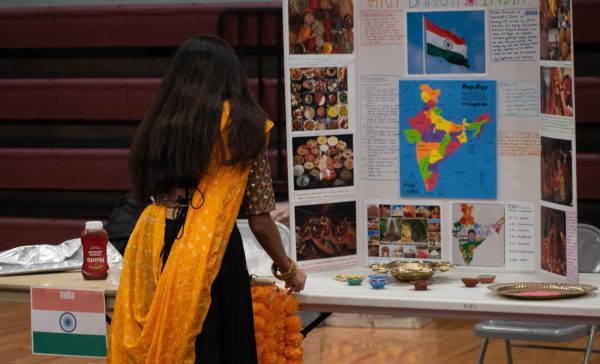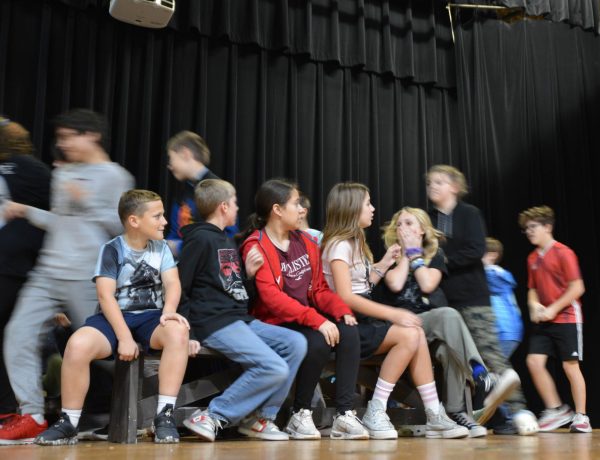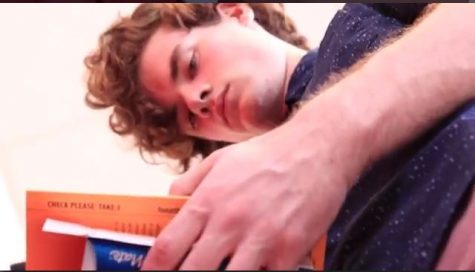Author visits RHS students during National Novel Writing Month
Author of Playing with Matches and Almost Perfect, Brian Katcher visited Rolla High School on November 7, 2011 to speak about his writing endeavors with English students.
Katcher also has a job to support a growing family.
“I’m a school librarian at an elementary school, K-2. I teach library and computers.
I really enjoy that, I could see myself doing that until I retire, but at the same time writing is certainly a fun thing to do. If I could earn enough money as a writer, I think I could see myself doing that,” Katcher said.
When not working in the library, Katcher spends his free time working on new novels
and enthralling his readers with complex story lines. Writing a novel doesn’t happen overnight; Katcher spent a whopping ten years on his first book Playing with Matches, starting in 2001.
“I was living in the country of Mexico at the time. My girlfriend told me, ‘Hey, I’m moving to Germany. Bye!’ and I thought, ‘Okay, I need something to do with my time. Why not write a book?’ It was just something I thought I’d do for fun. I really honestly never thought it would be published. So, I’m very happy with my successes,” Katcher said.
Katcher didn’t have much experience under his belt when he first began as a novelist.
“I had no training when it comes to writing and I never wrote anything creatively up until that point since high school. I was twenty-five at the time. I read a lot. I just kind of sat down and started telling the story. Eventually one day I finished it,” Katcher said.
Writing a book can be, and probably will be, more difficult for someone who hasn’t done
much reading.
“I’ve always been a very big reader. When I was in Mexico, I was immersed in Spanish
all day long, so when I could find something in English, I’d want to read it. Sometimes I’d read something and I’d think, ‘I wish I could be one tenth of the writer that this person is,’ and sometimes I’d read something and think, ‘This guy got published, really?’ It is a matter of knowing your nuts and bolts. If you don’t read, it is harder to write,” Katcher said.
Reading is a key part of being a respectable writer. Katcher recommends a few of his favorite books. But since he has been reading much longer than the average high-schooler, plots for novels have changed drastically.
“There are a lot of good young adult books out now. When I was in high school, there were very few books that were say, aimed at teenagers. And what books there were, they were very light, uninteresting things. Or very very preachy or very ‘DON’T USE DRUGS, DON’T STAY OUT AFTER CURFEW. I’M SERIOUS.’ It was like reading a lecture. I’ve been reading a lot of the young adult books by John Green, David Levinson, Alex Sanchez, The Hunger Games. I just wish there were books like that when I was growing up. I went from chapter books, straight to adult fiction. I never felt like anyone was writing about what I was going
through.
Katcher chose a classic story of a boy choosing between outer appearance and inner beauty for his initial plot of Playing with Matches.
“I like to think of it as in my favorite book, Catch 22, there was a scene where the main guy was walking through the streets alone during World War II and he comes across a woman with a face that is badly scarred. And he says he was ‘so sorry for her, nobody would ever love her.’ I remember thinking, ‘That’s kind of harsh. Nobody would ever love her? There’s nobody that could get past that?’ And maybe that’s where the germ came from. How
willing are we to concentrate on outward appearances and ignore absolutely everything else,” Katcher said.
In Katcher’s books, he likes to explore things that aren’t typically talked about.
“I think it would actually be more difficult writing about something that’s not hard. It’s difficult to write about a difficult subject, but at the same time if you’re not writing about something that’s not difficult, it seems like it would be not very interesting,” Katcher said.
Katcher manages to portray a high school setting and the characters that make it up accurately even after being out of school for so long.
“I thought, ‘What was I like at sixteen? I was a little potty-mouth vandal. I cussed all the time and I cussed for effect. If I’m going to write about this, it’s going to be right. I’m not going to write a sanitized version of how I think it should be.’ Maybe I went a little overboard, there was a high school principal in Pennsylvania that wanted to pay me to come out and talk to his school, and then later he said, ‘Sorry the school board said no. You used the F word in your book.’ From every word in that book, that’s the one they saw. That one word was more important than all the other words. You take a risk when you
use that kind of language, you risk offending some reader but at the same time, you have to make the book realistic. This is the way it was and life isn’t always a beautiful thing,” Katcher said.
Playing with Matches was based largely on personal experience.
“Well, Leon [the main character]—and anybody who went to high school with me would
realize this—is basically me in 1992. It was just straight-out me. Every reaction, everything he did was me. If he’s kind of an awkward nerd, it’s because that was the awkward nerd I was in high school. Melody is the only original character; everybody else is pretty much straight out of my teenage years; all the teachers, the friends, the parents. My sister was very angry that there was no sister in this story,” Katcher said.
Katcher’s second book, Almost Perfect, was more of a research-based novel.
“For Almost Perfect I had to do a lot of research. Most of my books take place in Missouri, in places I’m familiar with. I think it would be hard if I set a book in San Francisco and think, ‘Well, where does that street go? Or what time does that such and such place open up?’ It can be done, but it’s much easier to draw from your own life and things you’re familiar with. I wanted something that hadn’t been done a lot, so I started kicking rocks and then I thought ‘What if a boy falls for a girl and realizes she wasn’t born a girl? She’s a girl in spirit but maybe not 100% physically.’ So I wrote it as a short story and showed it to my writers group.
They said it was interesting but ‘You’re not going to tell the story in 50 pages. If you want to tell this story you’ve got to do it as a novel.’ I had to do a lot of research because I didn’t want a transgendered to say ‘Oh, you’re just being cute’ or ‘you just used this plot to sell books and you don’t know what it’s like.’ That has never happened. In fact I’ve had several people say ‘That’s exactly what I went through.’ It pays to do your research,” Katcher said.
Creating a publishable book can take some serious time with the research that goes into
it and dedication to keep on going.
“From the idea to having something I can show my editor, over a year. With the revision you have to wait another year after that until it comes out. It’s a slow process, and frustrating at times, but absolutely worth it,” Katcher said.
Getting published isn’t always the easiest task. Sometimes it could even be more difficult than writing the actual book.
“So many people are sending out manuscripts, and it’s so hard for editors to think, ‘Out of this huge pile, which one of these is going to make us the most money?’ It’s just a matter of getting the right manuscript in front of the right person at the right time,” Katcher said.
Katcher has some advice for aspiring teenage authors.
“If you’re a kid trying to write a book then you’re one step ahead of where I was in high school. I wish I had started that early. It’s just like playing a musical instrument or excelling at a sport, the more you do it, the better you are. I piddled around until I was 25, and I thought “I could be ten years better than this.” By just getting started, you’re doing a good thing. Talk to people you know will give you an honest opinion. It’s good to be praised, but you need to know what you’re doing wrong. An editor is not going to take the
time to say this is why I didn’t like your book. Don’t think ‘I have to have every comma and period in place, I have to have every term or phrase perfect,’” Katcher said.
Katcher hopes to be a well-known author for a while.
“My first book came out in 2008, so I’m still the new guy on the block. I haven’t worked with many people yet,” Katcher said.
Everyone has a backup plan, in case their choice of lifestyle doesn’t seem to work out. Luckily, for Katcher, a need for Plan B has not arised.
“I wanted to be a rock star. In college I had the guitar and everything, and I came to the hard conclusion that I have no natural sense of tone or rhythm so that kind of fell apart. If I had to be anything besides a writer or a teacher, I think I would have been an archeologist. I’m meticulous enough, I like research enough. I think that would have been interesting, that’s really all I’ve ever thought about as an alternate career,” Katcher said.
Katcher’s job as a librarian and elementary school teacher could be considered as a side
job to his career as an author. He is currently re-working his third book.
“The book that had been sold and fell through was called Mysterious Ways and it was the first time I wrote from a girl’s point of view. She is an aspiring artist, she has a very bad home life, and her parents are very emotionally abusive. She meets a guy who claims that the internet doesn’t report the news; the internet controls the news because people
believe whatever they read online without checking to fact check; whatever people believe becomes the truth. He starts demonstrating this by planting news stories and starting rumors. She realized that this kid can really affect major policy just by doing his behind the scenes stuff. Then she realizes that he has a lot of scores to settle, he thinks that he has been wronged in the past and he actually has been. He’s out to really get some revenge on people and she has to think, ‘is it right to settle a score like this? Should I try to stop him,
or should I try to help him?’ So, hopefully somebody will want to buy that one,” Katcher said.
In the world of writers, the month of November is known as National Novel Writing
Month [NaNoWriMo]. The goal of this month is to write a 50,000 word novel. Katcher has a piece of advice for students participating in NaNoWriMo.
“It is really a matter of personal preference. I think a lot of people do that just because they say, ‘I’m going to write, I’m going to write.’ Well, here it comes. You’re going to write, you’re going to get this done in a month. It gives you a self-imposed deadline. And you are going to think for better or for worse, I am going to have a novel done. Now, if you’re writing a whole novel in one month you probably are going to have to end up re-writing it. That is a very short time to write a whole book. Now instead of just thinking I’m going
to write, you think I’ve got the whole outline here, the whole skeleton of the book. Now I’m not under a deadline, I can take time to smooth it out. I’ve never participated just because I know I would probably not finish it, but I find deadlines are very helpful. When my editor says to me, ‘You’re going to have this completed in front of me by such and such date,’ I think, ‘Okay, no more screwing around. I have to get this done, I have no choice. So I think
that really does kind of light a fire under people. So, good luck with that,” Katcher said.
Katcher has high hopes for his future as a writer.
“Hopefully, I will be published again. I’m rewriting the rejected book. I had a book that was in contract, they had paid me and everything, but then my editor quit. I’m definitely writing, I’m definitely not giving up, so hopefully we’ll see something new out,” Katcher said.








